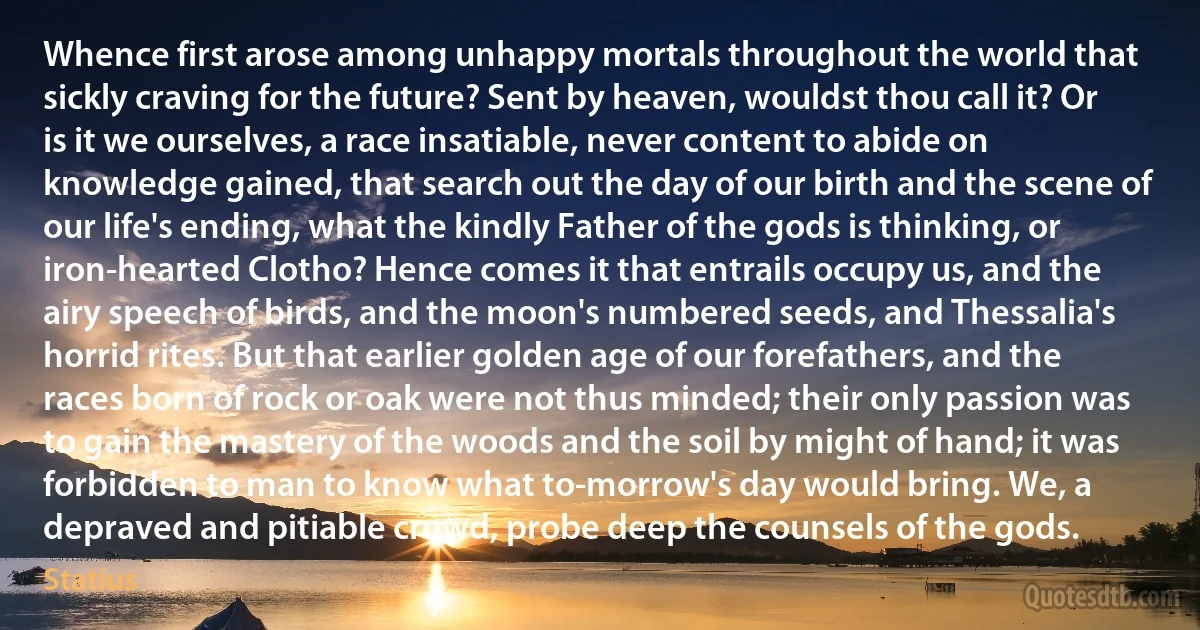
Whence first arose among unhappy mortals throughout the world that sickly craving for the future? Sent by heaven, wouldst thou call it? Or is it we ourselves, a race insatiable, never content to abide on knowledge gained, that search out the day of our birth and the scene of our life's ending, what the kindly Father of the gods is thinking, or iron-hearted Clotho? Hence comes it that entrails occupy us, and the airy speech of birds, and the moon's numbered seeds, and Thessalia's horrid rites. But that earlier golden age of our forefathers, and the races born of rock or oak were not thus minded; their only passion was to gain the mastery of the woods and the soil by might of hand; it was forbidden to man to know what to-morrow's day would bring. We, a depraved and pitiable crowd, probe deep the counsels of the gods.
StatiusRelated topics
age born birth call comes content crowd day deep early ending entrails father future gain golden hand heaven knowledge man might oak passion probe race rock scene search sent soil speech thinking thou thus unhappy world woods godsRelated quotes
Had there not been a natural goodness and indestructible force in my father, I see not how be could have bodied himself forth from these mean impediments. I suppose good precepts were not wanting. There was the Bible to read. Old John Orr, the schoolmaster, used from time to time to lodge with them; be was religious and enthusiastic (though in practice irregular with drink). In my grandfather, also, there seems to have been a certain geniality; for instance, he and a neighbor, Thomas Hogg, read "Anson's Voyages;" also tho "Arabian Nights," for which latter my father, armed with zealous conviction, scrupled not to censure them openly. By one means and another, at an early age he had acquired principles, lights that not only flickered, but shone steadily to guide his way.

Thomas Carlyle
Man is gifted with pity and other kindly feelings; he has also the power of preventing many kinds of suffering. I conceive it to fall well within his province to replace Natural Selection by other processes that are more merciful and not less effective.This is precisely the aim of Eugenics. Its first object is to check the birth-rate of the Unfit, instead of allowing them to come into being, though doomed in large numbers to perish prematurely. The second object is the improvement of the race by furthering the productivity of the Fit by early marriages and healthful rearing of their children. Natural Selection rests upon excessive production and wholesale destruction; Eugenics on bringing no more individuals into the world than can be properly cared for, and those only of the best stock.

Francis Galton
Were we required to characterise this age of ours by any single epithet, we should be tempted to call it, not an Heroical, Devotional, Philosophical, or Moral Age, but, above all others, the Mechanical Age. It is the Age of Machinery, in every outward and inward sense of that word; the age which, with its whole undivided might, forwards, teaches and practises the great art of adapting means to ends. Nothing is now done directly, or by hand; all is by rule and calculated contrivance. For the simplest operation, some helps and accompaniments, some cunning abbreviating process is in readiness. Our old modes of exertion are all discredited, and thrown aside. On every hand, the living artisan is driven from his workshop, to make room for a speedier, inanimate one. The shuttle drops from the fingers of the weaver, and falls into iron fingers that ply it faster.

Thomas Carlyle
At the end of the bronze age a residue of Greek tribes stayed behind in Southern Macedonia[...] one of these, the "Makedones" occupied Aegae and expanded into the coastal plain of lower Macedonia which became the Kingdom of Macedon; their descendants were the Macedonians proper of the classical period and they worshipped Greek gods. The other Greek tribes became intermingled in upper Macedonia with Illyrians, Paeonians and Thracians[...] in the early 5th century the royal house of Macedon, the Temenidae was recognised as Greek by the Presidents of the Olympic Games. Their verdict was and is decisive. It is certain that the Kings considered themselves to be of Greek descent from Heracles son of Zeus. "Macedonian" was a strong dialect of very early Greek which was not intelligible to contemporary Greeks.

N.G.L. Hammond
If you are a Christian, no earthly city is yours. Of our City ‘the Builder and Maker is God.' Though we may gain possession of the whole world, we are withal but strangers and sojourners in it all. We are enrolled in heaven: our citizenship is there! Let us not, after the manner of little children, despise things that are great, and admire those which are little! Not our city's greatness, but virtue of soul is our ornament and defence. If you suppose dignity to belong to a city, think how many persons must partake in this dignity, who are whoremongers, effeminate, depraved and full of ten thousand evil things, and at last despise such honour! But that City above is not of this kind; for it is impossible that he can be a partaker of it, who has not exhibited every virtue.

John Chrysostom
